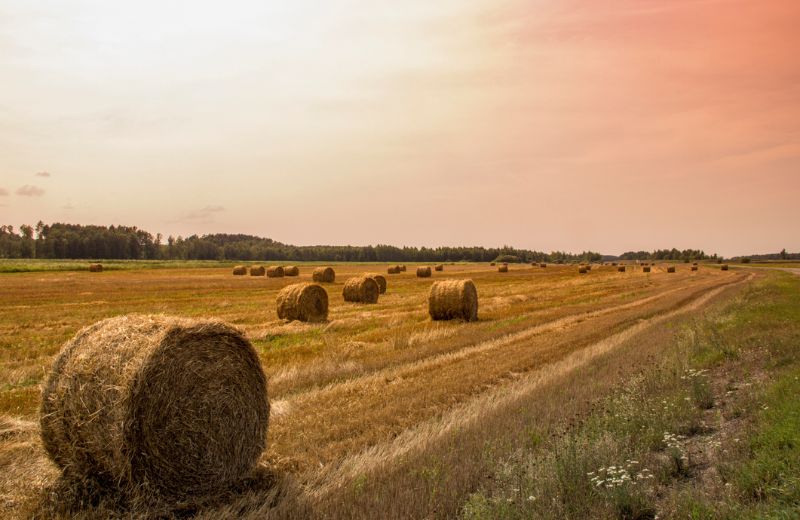not featured
2025-05-29
5/29/2025
Agriculture
published
%20(51).jpg)
Guide to Starting a Farm in Berryville
Starting a Farm in Berryville
Arkansas is home to 14 million acres of farmland and Berryville, located in the Ozark Mountains, is a great place to enjoy the quiet life while starting a farm of your own. The climate in Northwest Arkansas might not be ideal for corn, wheat and other crops, but it’s the perfect place to raise cattle and poultry, including chickens and turkeys. With agriculture making up a large share of our local economy, CS Bank is proud to invest in local farmers and farms. We’ve been helping new farmers like you for more than a century. In this guide, we’ll share everything you need to know about starting a farm in Berryville and insights from our ag lenders who are farmers themselves.
Develop a business plan
Whether or not you need to apply for agriculture loans to start your farm, the process of writing a business plan will help you articulate your plans, test the viability of your idea, and outline the next steps for reaching your long-term goals. The most important elements of an ag business plan are:
- Value proposition: Write a sentence describing the purpose of your farm and how it will offer value to your customers. Will you raise livestock or offer recreation opportunities to the public?
- Market need: What solution will your farm provide to a current gap in the market? For example, perhaps there are no local farms offering Community Supported Agriculture (CSA) subscriptions.
- Competition: Identify any existing farms in your market that do the same thing(s) you want to do. How will you differentiate yourself and offer a better alternative?
- Customer Profiles: Sketch your ideal customers (s) such as individuals at a farmer’s market, restaurants, wholesale, and more.
- Sales and Marketing: Don’t skip this section just because you have a slim budget or have no experience in advertising. Social media makes it easy for new farmers to establish an online footprint, so create a Facebook or Instagram profile for your farm. This is an easy way to provide basic information about your business, publish updates, and share photos and videos that entice customers. The next step would be to create a website.
- Budget and Sales Goals: List your basic operating costs such as mortgage or rent payments, equipment loans or rentals, supplies, maintenance, and labor. Next, estimate the amount of product you can sell. Look at your monthly estimates over the course of a year to see if it will work financially. In the beginning, you may have a day job and not need your farm to support you financially.
- Milestones: When you imagine your farm over the next few months and years, what do you see? List a few specific outcomes that would make you feel successful in running your farm.
- Team: Who is helping you start and run the farm? This could include family members and paid laborers.
- Funding: Are you starting a farm with your own funds or will you need to apply for grants and ag loans?
Check out these examples of Farm & Agriculture Business Plans for inspiration and guidance!
Get to know the United States Department of Agriculture (USDA)
Talk to Experts
The USDA has a New Farmers section on its website with helpful information and resources. Check out their First Steps page and read about any relevant niches such as Women in Ag, Young Farmers, and Veterans.
You will also want to get to know the Carroll County Farm Service Agency (FSA), which is located here in Berryville. The Arkansas State website provides news and information about programs and services for Arkansas farmers.
CS Bank understands ag lending because many of ag lenders are also farm owners. We understand just how much work goes into starting a farm. Here’s what our farm experts have to say:
“Get comfortable being uncomfortable.” “In the Agriculture Industry things change in a instant. As farmer /rancher you must be able to adapt to many factors that we have no control of weather, diseases and input prices to name a few. Being able to make adjustments to your operation is critical in your bottom line.” – Chris Meador, Vice President, Berryville Market
“Margins are low, hours are long but it’s worth every minute. If you aren’t inheriting the farm, you’ll need to keep your day job. A relationship with a local banker may be your most important input.” - Bob Rawson, Senior Vice President, Huntsville Market
“Farming is a way of life, a passion for the lifestyle and the animals we are stewards of. Passing this lifestyle and management practices on to future generations make the evolving seasons worth every minute. As with any business, knowledge is power. Take advantage of any literature you can get or associations you can join.” – Matt Cleaver, Vice President, Huntsville Market
One of the most important things you can do as a new farmer is to develop relationships with experts and mentors such as other farmers and professionals like attorneys, accountants, and ag lenders. At CS Bank, many of our ag lenders are farmers themselves. You can count on local expertise from our years of hands-on experience with running farms and making loans to other farmers in Northwest Arkansas.
Secure Land
When it comes to obtaining the right parcel of land for your farm, the first decision you’ll make is whether to purchase your land or lease it from a farmland owner who isn’t currently farming the land. Leasing offers flexibility to the beginning farmer, but if you have the credit and capital to purchase your land with an ag real estate loan, you can enjoy the feeling of having complete control over your farm’s future. Here’s what to consider when looking for farmland:
- b: Think about the kinds of services you want or need to be within a short driving distance of such as schools, healthcare, and shopping.
- Water sources: Make sure you have adequate water farm operations, and your personal needs. Generally, you’ll have a well or a connection to the municipal supply. You may also have a pond on your land to provide water for livestock.
- Soil quality: Get a soil test to make sure it’s a good match for what you want to do with the land.
- Structures: Does the parcel of land already have the facilities you need, such as livestock fencing and housing, or will you need to build them? Is there access to a public road?
- Neighbors: What else is around you? If it’s another farm, make sure that their farming activity won’t interfere with yours.
Apply For Ag Funding
Whether you need financing to purchase land, equipment, or livestock and poultry, there are ag loans available for every type of need:
- Poultry Loans: Purchase birds or make improvements to your current poultry house.
- Livestock Loans: Purchase livestock or finance seasonal needs for supplies and facility upgrades.
- Ag Equipment Loans: Purchase all kinds of farm equipment such as tractors, balers, and more.
- FMAC Loans: We are a loan originator and servicer for Farmer Mac Loans, the nation’s premier secondary market for agricultural credit.
- Ag Operating Loans: Access the working capital you need to survive seasonal cash flow shortages.
- FSA Loans: Guaranteed through the Farm Farm Service Agency to assist farms who do not meet normal underwriting criteria.
- SBA Farm Loans: Small Business Association loans for qualified farmers.
Set Up Your Ag Business Finances
Contact The Ag Lending Experts at CS Bank!
Even if your farm is primarily a hobby or second source of income, you are still running a business and should separate your ag finances from your personal accounts. Open an ag checking account and ag savings account to manage the money flowing into and out of your farm.
Whether you’re ready to apply for farm loans or are still gathering the information you need to start your farm in Berryville, our experienced ag lenders are here to answer your questions and provide advice from our years on the job. Contact us today!


